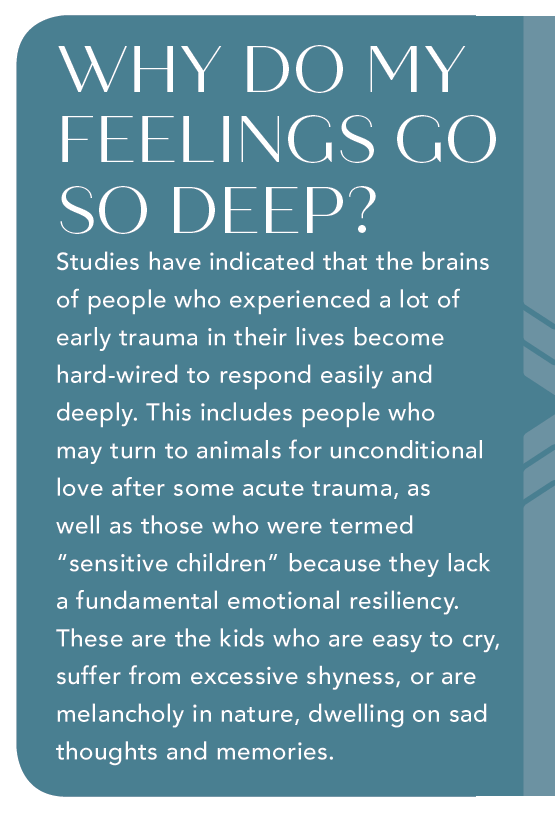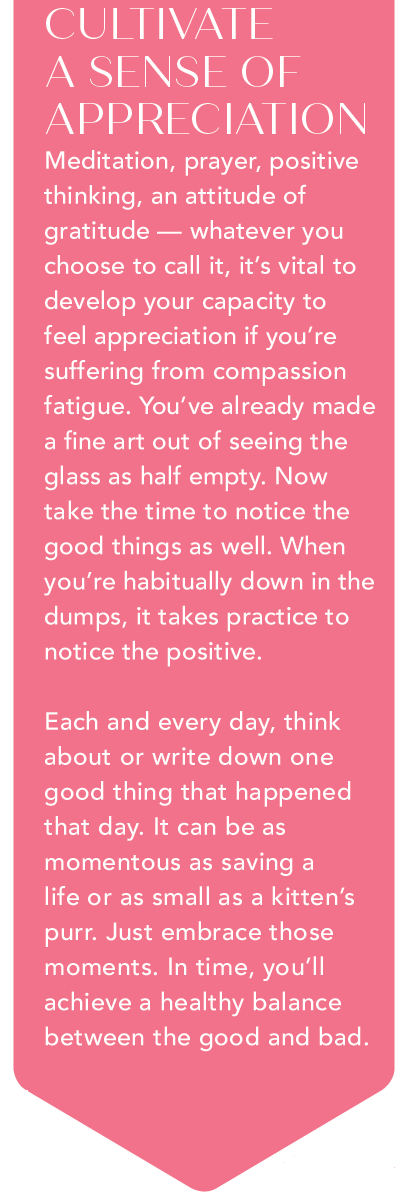When we love animals “too much” — coping with compassion fatigue

If you work with animals on a daily basis, you may be familiar with compassion fatigue, the emotional distress and burnout that come from trying to save every dog or cat you encounter. It’s important to recognize the signs — and take steps to help yourself.
Those of us who work with animals know we’re the luckiest people on earth. We get to spend our days with dogs, cats and other critters, whether we volunteer at shelters, run rescue groups or work in veterinary practices. Many would gladly trade places with us so we hate to complain…but the truth is, caring for animals can be among the most stressful of occupations. Suicide rates for animal care workers are right up there with police officers and firefighters. And it’s a cruel irony that “animal people” tend to be especially sensitive. We care deeply for every creature in our care. Couple this with the abuse and cruelty we often witness and it’s no wonder most of us reach a career crisis at some point, when we just can’t take it anymore. It used to be called burnout, but the correct term now is compassion fatigue, and it’s endemic among people in care professions of all kinds.
 Caring for animals is especially difficult work
Caring for animals is especially difficult work
Animal care workers and volunteers know they can’t save every dog and cat, but many take on that goal as their personal responsibility since dogs and cats can’t speak, advocate for or protect themselves. We cope with some symptoms of compassion fatigue on a daily basis, unless we’re brand new to the job and still in the honeymoon phase. The disorder arises from the familiar and instinctive “fight or flight” response we all have. To protect ourselves, we may become depressed, angry or overly cynical. We may find ourselves avoiding clients or not returning phone calls. We might adopt a strong sense of denial or a silencing response, in which we simply refuse to accept we have a problem.
These symptoms are enhanced when we’re unable to achieve a separation between our work and private lives. We’re never off the clock. Many of us literally bring our work home with us each and every day.
Full-blown compassion fatigue
Put all these triggers together and it’s no wonder we often feel overwhelmed. Full-fledged compassion fatigue sets in when we experience some or most of these symptoms and we feel unable to refuel or regenerate. Everyone has the occasional bad day and everyone has ways of coping. We may go home and soak in a hot bubble bath, commune with nature or do yoga or another form of exercise. Everyone has their avenues for self-care. Of course, some of those outlets are themselves unhealthy. A person can develop disorders around food, alcohol or drugs, or engage in gambling, cutting or other compulsive behaviors.
Luckily, for most people, this doesn’t happen and we are able to spring back from a bad day or sad experience. But what if we can’t? What if we are far into compassion fatigue and unable to pull ourselves back from the brink? The good news is, there’s help. Almost all of us can re-learn how to handle the worst of our stressors. Very rarely is it necessary to stop helping needy animals. In other words, you can avoid a career change and regain those energizing, intensely satisfying feelings that attracted you to working with animals in the first place.
 What to do about compassion fatigue
What to do about compassion fatigue
- The key is to acknowledge there’s a problem and to seek help. If simple self-care doesn’t alleviate the negative emotions, be prepared to see a counselor. You’ll need to find a therapist who respects you and doesn’t discount your intense feelings for animals. Talk therapy is invaluable when it comes to putting life’s events into perspective.
- Some animal care workers have taken the bull by the horns and started their own support groups. Having someone to lend a sympathetic ear to your suffering can work wonders. Unfortunately, most depressed or troubled people tend to avoid others rather than draw them closer. You’ll need to work at picking up the phone and connecting with someone when all you really feel like doing is getting in bed and pulling the covers over your head. It takes time. Every successful intervention helps create new, healthier habits.
- Be wary about using the buddy system just to share your misery. It can be easy to fall into a pattern in which people feed off one another’s anger or despair. That being said, it does often help to commiserate with others. If you can honestly relate to another person over an unpleasant event or experience, you’ll often wind up laughing in sheer relief when you find you are not alone, and that someone else feels just as you do.
- By all means, work with other people. But also find healthy ways to comfort yourself. These practices are going to become your refuge from the bad feelings. For some people, journaling can be a lifesaver. Just getting those toxic thoughts out from inside of you is important. Learn to breathe deeply. Anyone can do this simple form of meditation to let go of stress. You may also want to incorporate a symbolic item or calming scent into your space, anything to fully involve the senses.
- In extreme situations, where you’ve lost the joy that animals once brought you, consider taking a step back. Whether you take a day off to go to the spa or a movie, enjoy a long vacation, or even take an extended hiatus from animal care work or volunteering, you’ll come back renewed. Remind yourself that you’re not giving up or giving in whenever you take time to do what you need to make yourself better.
- A concept in mindfulness training states that some people come to believe that their distorted thoughts are reality. If you can, try to identify those thoughts and learn to replace them with positive ones. It takes time, effort, and perhaps a certain amount of uncomfortable introspection, but it’s worth it. If you’re having difficulty, consult a therapist who specializes in mindfulness training.
Whatever techniques you use to return balance to your life, be sure to continue caring and staying open to your emotions. With time and patience, you can come back from compassion fatigue feeling happier and more effective than before Whether you work in a veterinary clinic or volunteer at the local shelter, you chose to make animals a central part of your life – just remember to take care of yourself as well!



